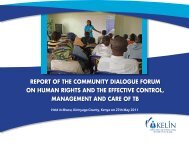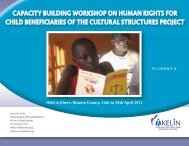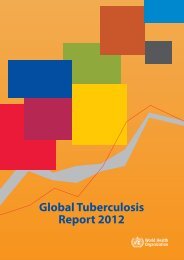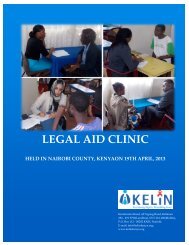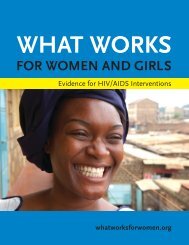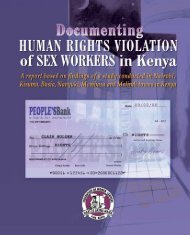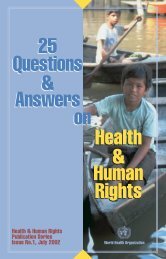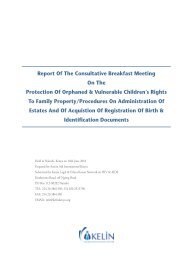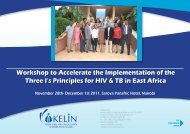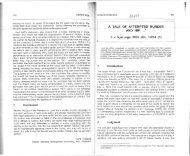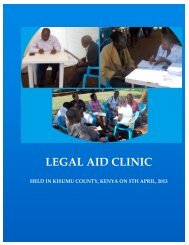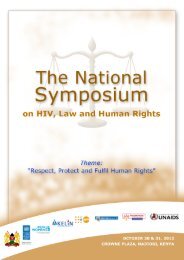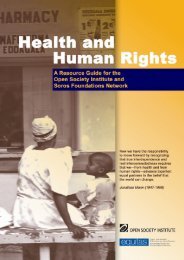Post Training Assessment Report - Kelin
Post Training Assessment Report - Kelin
Post Training Assessment Report - Kelin
Create successful ePaper yourself
Turn your PDF publications into a flip-book with our unique Google optimized e-Paper software.
WOMEN’S INHERITANCE RIGHTS PROJECT<br />
IN THE TOWN OF HAWASSA<br />
<strong>Post</strong> <strong>Training</strong><br />
<strong>Assessment</strong><br />
<strong>Report</strong><br />
October, 2012<br />
Prepared by KELIN,<br />
Kindaruma Road, off Ring Road Kilimani,<br />
P.O Box 112-00202, Nairobi,<br />
Tel: 254 20 251 5790<br />
Email: info@kelinkenya.org<br />
www.kelinkenya.org
<strong>Post</strong> <strong>Training</strong> <strong>Assessment</strong> <strong>Report</strong><br />
PREFACE<br />
KELIN is a legal NGO working to protect, promote and advance health and HIV related human rights in<br />
Kenya. Our objective is to undertake advocacy and provide leadership in enhancing human rights<br />
approaches in health and HIV strategies and programs. Our vision is the full enjoyment of HIV related<br />
human rights for all and our mission is to promote and protect HIV related Human Rights.<br />
KELIN responds to legal, ethical and human rights concerns relating to health and HIV by:<br />
• Providing legal services including legal advice and litigation to people who have suffered<br />
health related human rights violations – especially people living with HIV and other vulnerable<br />
groups – using KELIN staff and our network of pro bono lawyers.<br />
• Strengthening and building capacity of health professionals, lawyers, community workers and<br />
people living with HIV on health and other related human rights including working from a rightsbased<br />
approach in service provision.<br />
• Engaging in advocacy campaigns that promote awareness of human rights issues in national<br />
laws and policies to governments, organizations and communities.<br />
• Research on areas relating to human rights, legal issues and health, contributing to new<br />
legislation and supporting evidence-based change.<br />
KELIN’s current main program areas are around: promoting alternative dispute resolution in securing<br />
justice for vulnerable groups like widows and orphans, campaigning for sustainable funding for health<br />
services, ensuring the government effectively supports the rights of TB patients and facilitating various<br />
people in Kenya to know and use their human rights. We continue to ensure government accountability<br />
in guaranteeing the progressive realization of the provisions of the right to health as envisioned by the<br />
Constitution of Kenya 2010.<br />
For more information on KELIN and its work visit www.kelinkenya.org<br />
ii | P a g e
CONTENTS<br />
ACRONYMS………. .................................................................................................. IV<br />
EXECUTIVE SUMMARY ............................................................................................ 5<br />
1.0 BACKGROUND ................................................................................................ 7<br />
2.0 ASSESSMENT APPROACH/METHODOLOGY....................................................... 8<br />
2.1 PURPOSE OF THE REVIEW ....................................................................................... 8<br />
2.2 SPECIFIC OBJECTIVES ............................................................................................ 8<br />
2.3 SPECIFIC TASKS ................................................................................................... 8<br />
2.3.1 Desk Review ................................................................................... 8<br />
2.3.2 Key Informant Interviews ................................................................. 9<br />
2.3.3 Focus Group Discussion ................................................................. 9<br />
2.3.4 Individual Interviews ........................................................................ 9<br />
3.0 FINDINGS 9<br />
3.1 RELEVANCE AND EFFECTIVENESS OF THE TRAININGS......................................................... 9<br />
3.2 PROGRESS IN ACHIEVING EXPECTED RESULTS ............................................................... 12<br />
3.3 CHALLENGES, LESSONS LEARNED AND BEST PRACTICES .................................................... 15<br />
4.0 CONCLUSIONS AND RECOMMENDATIONS ..................................................... 16<br />
5.0 LIST OF PERSONS INTERVIEWED ............................................................................... 18
<strong>Post</strong> <strong>Training</strong> <strong>Assessment</strong> <strong>Report</strong><br />
ACRONYMS<br />
AIDS<br />
APHIA<br />
CDF<br />
CSP<br />
HIV<br />
KELIN<br />
Acquired Immune Deficiency Syndrome<br />
AIDS, Population and Health Integrated Assistance<br />
Constituency Development Fund<br />
Cultural Structures Project<br />
Human Immuno-deficiency Virus<br />
Kenya Legal and Ethical Issues Network on HIV and AIDS<br />
LAGNET Last Generations Theatrics<br />
USAID<br />
WDF<br />
United States Agency for International Development<br />
Women Development Fund<br />
iv | P a g e
<strong>Post</strong> <strong>Training</strong> <strong>Assessment</strong> <strong>Report</strong><br />
EXECUTIVE SUMMARY<br />
The overall purpose of the assignment was to review the outcome of the capacity building workshops<br />
targeting elders, widows and child beneficiaries that were conducted between April and May 2012; and<br />
assess the status of implementing the agreed action plans. The review was conducted between August<br />
21 and 23 2012 through desk review, field visits and interviews with the project beneficiaries and<br />
partners.<br />
The training measures carried out by KELIN have been largely successful in scaling up the cultural<br />
structures initiative and facilitate increased access to justice for widows and their children. The trainings<br />
have significantly increased knowledge and awareness levels on the constitutional and legal provisions<br />
on the rights of widows and their children. While it may be too early to conclusively assess the long term<br />
results of the trainings, there are clear indications that the intended results will be achieved. Already<br />
some outcome level results have started emerging among the widows, elders and children with a clear<br />
resolve and commitment to fight for increased recognition and respect of the rights of widows to own<br />
and inherit property; and ensure that their children also realize their basic rights.<br />
With increased understanding among the elders on the rights of widows and their children, and a<br />
resolve from the elders to arbitrate on disputes from a rights based perspective, there are prospects for<br />
increased access to justice especially on issues related to land and property rights among widows and<br />
orphans in the coming months.<br />
The training has also provided opportunities for economic empowerment among women through<br />
information sharing and creating linkages with the Women Enterprise Fund. Although not included in<br />
the project objectives and activities, cross-cutting topics on HIV especially in managing stigma and<br />
promoting healthy practices among youth have impacted positively on the training participants.<br />
To address some of the challenges that were noted during the assessment and ensure successful<br />
completion of the project and realization of intended results, it is recommended that:<br />
<br />
<br />
<br />
Mechanisms of engaging the training beneficiaries beyond the formal training need to be<br />
explored to ensure increased impact. Where possible, the participants need to be supported to<br />
reach out to more community members and sensitize them on the rights of widows and orphans<br />
and other relevant topics. The support should include technical backstopping such as having<br />
experienced experts accompanying the trained community members when carrying out<br />
community sensitization. This will ensure creation of a critical mass of informed community<br />
members that can effectively advocate for the rights of widows and their children.<br />
Establishing strong linkages with relevant government departments is critical in increasing the<br />
visibility of KELIN and facilitating increased access to justice for the targeted beneficiaries.<br />
KELIN should consider reaching out to chiefs and their assistants in future trainings. The chiefs<br />
can be a barrier to actualization of the right to land and property ownership, among other<br />
rights, if not well sensitized. <strong>Training</strong> of this target group on land and property rights, human<br />
rights and the role of cultural structures in dispute resolution will ensure increased recognition<br />
5 | P a g e
<strong>Post</strong> <strong>Training</strong> <strong>Assessment</strong> <strong>Report</strong><br />
of the council of elders and facilitate access to justice for widows and orphans especially in<br />
resolving land and property disputes that are common among widows and orphans.<br />
<br />
<br />
<br />
The Luo Council of Elders needs to adopt measures to advocate for increased accountability and<br />
transparency in the allocation and use of devolved government resources such CDF and ensure<br />
that widows and their children have access to these funds. This will help in further enforcing the<br />
right of orphans to education and other basic human rights as envisaged in the constitution.<br />
There is need to improve documentation and reporting of the outcomes of the training<br />
especially through the use of qualitative approaches such as success stories, case studies, video<br />
documentaries etc. These techniques will help KELIN tell its story better and demonstrate the<br />
impact of various interventions.<br />
Integration of post training support mechanisms in future training programs should be<br />
considered to ensure effective follow-up and increased impact of training measures.<br />
6 | P a g e
<strong>Post</strong> <strong>Training</strong> <strong>Assessment</strong> <strong>Report</strong><br />
1.0 BACKGROUND<br />
Access to justice among widows and orphans especially in terms of inheritance rights remains a key<br />
challenge in many parts of Kenya. Although there are clear constitutional and legal provisions on the<br />
rights of widows and orphans to inherit property, a number of cultural, social, economic and legal<br />
factors continue to pose hurdles to the enjoyment of the fundamental rights on property ownership and<br />
inheritance. Few women can access justice through the formal court system due to inhibitive high costs<br />
and lengthy procedures. The low awareness level on the constitutional and legal entitlements is another<br />
factor that contributes to high levels of disinheritance among widows and orphans. Retrogressive<br />
cultural beliefs and practices among certain communities have also exacerbated the situation with many<br />
widows and orphans suffering unacceptable levels of injustice and inhumane treatment from immediate<br />
family members and the community.<br />
It’s in response to the above challenges that KELIN has embraced the use of alternative dispute<br />
resolution mechanisms to facilitate access to justice. Since 2009, KELIN has been implementing a project<br />
known as “Working with Cultural Structures to Facilitate Access to Justice by Widows and Orphans” that<br />
aims to utilize community structures (Elders and community leaders) to boost the right to access, own<br />
and inherit property by vulnerable widows and orphans. In recognizing that the formal legal systems are<br />
not always accessible to many vulnerable women in Kenya this innovative initiative recognizes the<br />
power of culture and positively engages with it to ensure it operates positively for the protection of the<br />
rights of the vulnerable women and children.<br />
Working with the community elders in Nyanza region in Kenya, this initiative has facilitated informal<br />
mediation between disputing parties providing the safe space to iron out family property<br />
disagreements. The initiative has since 2009 taken up 156 cases involving disinheritance of widows, out<br />
of which 95 cases (about 60%) have been successfully resolved in favour of the women, and 51 cases are<br />
still ongoing, 4 have been referred to other departments and networking partners, 4 cannot be traced<br />
and 2 passed away during the process. In addition, 17 semi-permanent houses have been built for the<br />
most vulnerable widows and their children within a period of 36 months.<br />
The success of the cultural structures initiative resulted to the introduction of the Women’s Inheritance<br />
Rights project to replicate and scale-up the gains realized through the CSP. The goals/objectives of the<br />
Women`s Inheritance Rights Project are to:<br />
1. Scale up the existing Cultural Structures Project (CSP) to provide access to justice for more<br />
widows in the targeted geographical area;<br />
2. Enhance accessibility of the CSP services;<br />
3. Strengthen the CSP so that the elders are better able to arbitrate the cases from a rights based<br />
perspective; and<br />
4. Strengthen the CSP so that the widows and their children have increased knowledge on human<br />
rights.<br />
7 | P a g e
<strong>Post</strong> <strong>Training</strong> <strong>Assessment</strong> <strong>Report</strong><br />
Planned activities:<br />
<br />
<br />
<br />
<br />
<br />
<br />
Complete 20 more arbitrations;<br />
Set up an office in Kisumu County, in a location that is accessible to the target beneficiaries;<br />
Translate the tool on working with cultural structures to facilitate access to justice into one<br />
national and one local language that is suitable to the beneficiaries and partner organizations;<br />
Train the elders on the rights based approach, the Kenyan Constitution and human rights in the<br />
context of culture;<br />
Train widows and their children on human rights, the Kenyan Constitution and the arbitration<br />
process;<br />
Undertake a comprehensive evaluation of the project and its effect in the two counties.<br />
2.0 ASSESSMENT APPROACH/METHODOLOGY<br />
2.1 PURPOSE OF THE REVIEW<br />
The overall purpose of the assignment was to review the outcomes of the capacity building workshops<br />
targeting elders, widows and child beneficiaries that were conducted between April and May 2012; and<br />
assess the status of implementing the agreed action plans. The review was conducted from 21 st – 23 rd<br />
August 2012.<br />
2.2 SPECIFIC OBJECTIVES<br />
The specific objectives of the post training assessment included:<br />
1. Assess the relevance and effectiveness of the trainings in promoting increased access to justice<br />
and enjoyment of the right to property inheritance/ownership among widows and orphans;<br />
2. Assess the progress made towards realising the expected results and the status of implementing<br />
the post training action plans;<br />
3. Document any challenges, lessons learned and best practices at this stage;<br />
4. Make recommendations on any areas that require improvement or re-adjustment to enhance<br />
project performance and realization of expected results.<br />
2.3 SPECIFIC TASKS<br />
2.3.1 Desk Review<br />
Review of all relevant project documents including the project proposal for the scale-up of the Cultural<br />
Structures Project (CSP), training reports, project progress reports, online publications on women’s<br />
8 | P a g e
<strong>Post</strong> <strong>Training</strong> <strong>Assessment</strong> <strong>Report</strong><br />
property rights and other relevant literature was undertaken before commencement of actual field<br />
work. The specific action plans that were developed at the end of the trainings served as a basis for<br />
reviewing the progress in project implementation while project progress reports (quarterly and<br />
monthly) served as a means of assessing and verifying project achievements and challenges.<br />
2.3.2 Key Informant Interviews<br />
Interviews with key project partners and collaborators were carried out to obtain primary information<br />
on their perceptions on the capacity building workshops and the potential for enhancing the property<br />
rights of widows and orphans. Key people interviewed included the District Gender and Social<br />
Development Officers for Kisumu and Nyando Districts. The relevant officer(s) from the Children’s<br />
Department could not be reached during the field visit. The Regional Project Coordinator for KELIN also<br />
served as a key informant and the main liaison person in meeting all the other respondents.<br />
2.3.3 Focus Group Discussion<br />
Two Focus Group Discussions (FGDs) were conducted for elders and widows. The FGDs brought together<br />
the elders and widows from Nyando and Muhoroni Districts who had participated in the capacity<br />
building workshops held in April and May this year. The FGDs had 7 participants and lasted for an<br />
average of one and half hours.<br />
2.3.4 Individual Interviews<br />
One-on-one interviews with elders, widows and child beneficiaries were conducted to obtain their<br />
personal experiences from the training and gain insights on how the training is helping in addressing<br />
issues of property inheritance and the broader human rights issues as enshrined in the Kenyan<br />
Constitution and other legal tenets.<br />
3.0 FINDINGS<br />
3.1 RELEVANCE AND EFFECTIVENESS OF THE TRAININGS<br />
Increasing knowledge and understanding on the Kenyan Constitution, human rights and the arbitration<br />
process is a key prerequisite to the success of the women’s inheritance project and sustaining the gains<br />
made by the cultural structures project in promoting land and property rights among widows and<br />
orphans. <strong>Training</strong> of elders, widows and their children was therefore critical to ensure increased respect<br />
and promotion of the right to own and inherit property. Land remains a vital resource for sustaining the<br />
livelihoods of millions of people in the country and especially for rural communities that depend entirely<br />
on land as a source of livelihood.<br />
9 | P a g e
<strong>Post</strong> <strong>Training</strong> <strong>Assessment</strong> <strong>Report</strong><br />
3.1.1 Elders <strong>Training</strong> on Human Rights<br />
The main objectives for the Elders workshop were to increase understanding of human rights, related<br />
principles and key players in its promotion; increase understanding of the legal provisions protecting the<br />
rights of children, women and PLHIV; identify and address various challenges raised by legal and ethical<br />
issues in HIV; demystify myths about Luo culture and women’s land and property rights; discuss the legal<br />
provisions on land rights, and; appreciate the role of the project beneficiaries in advocacy for protection<br />
and promotion of women’s land and property rights. A total of 21 elders (17 male and 4 female) were<br />
reached through this training.<br />
Based on the focus group discussions with the elders who<br />
participated in the training, the contents of the training<br />
were very useful and relevant particularly in building the<br />
confidence of the elders to arbitrate on issues affecting<br />
women and children in relation to the right to inherit and<br />
own property in an informed and rights based approach.<br />
“The training has made our work as<br />
elders easier. We are now more<br />
confident of ourselves and are able<br />
to intervene effectively.”<br />
Most of the elders<br />
feel that the<br />
knowledge on the<br />
constitution and<br />
other laws<br />
touching on the<br />
rights of widows,<br />
children and<br />
persons with<br />
disability has<br />
enabled them to<br />
look at issues<br />
beyond the<br />
traditional and<br />
cultural mindset.<br />
The training has transformed them to strong defenders and advocates of the rights of women to own<br />
and inherit property from their deceased husbands and ensuring that orphans enjoy their right to<br />
education as provided in the Constitution.<br />
Rating of the training in terms of content, relevance and methodology on a score of 1-5 (1 being the<br />
lowest score and 5 the best score) revealed that the participants were happy with the training as<br />
indicated in Figure 1. Rating on content was slightly lower based on the perception of some participants<br />
that the time allocated for the training was too short to adequately cover the diverse topics. The use of<br />
interactive and participatory training methodologies with practical examples was applauded as an<br />
effective method of delivery. Use of experienced, knowledgeable and respected facilitators also served<br />
to enhance knowledge sharing to the participants.<br />
The training has also helped them to be more proactive in identifying cases of human rights violations in<br />
the community and intervene at an early stage. It has also broadened their perspective on various<br />
human rights issues and the inherent interrelationships between various rights. This has elevated the<br />
10 | P a g e
<strong>Post</strong> <strong>Training</strong> <strong>Assessment</strong> <strong>Report</strong><br />
role of the elders in the community as arbitrators and “peace building agents”. They now understand<br />
that violation of the right to property and land ownership greatly increases the vulnerability of widows<br />
and orphans to HIV and compromises their ability to enjoy other basic rights such as food, shelter,<br />
education etc.<br />
3.1.2 Widows <strong>Training</strong><br />
The training was very instrumental in increasing understanding on human rights and legal provisions<br />
protecting the rights of children, women and PLHIV; identifying and addressing various challenges raised<br />
by legal and ethical issues in HIV; demystifying myths about Luo culture and women’s land and property<br />
rights; discussing the legal provisions on land rights and appreciating the role of widows in advocacy for<br />
protection and promotion of women’s land and property rights. These are all pertinent topics that<br />
directly affect the<br />
lives of widows in<br />
the target project<br />
areas. In total 21<br />
widows benefited<br />
from this training.<br />
Based on<br />
discussions in the<br />
FGD, the widows<br />
who participated<br />
in the capacity<br />
building workshop<br />
indicated that it<br />
was an excellent<br />
training that<br />
greatly enhanced<br />
their knowledge<br />
and understanding of human rights, the Kenyan Constitution, The Children’s Act and The HIV & AIDS<br />
Prevention and Control Act 2006. The training helped in enhancing linkages with other government<br />
institutions especially the Gender and Social Development Department, which has financing<br />
opportunities for women who are keen to undertake various economic and income generating activities.<br />
Participants in the FGD rated the training positively in terms of content, relevance and methodology as<br />
indicated in Figure 2. Content received a slightly lower rating because some participants felt that some<br />
topics such as the constitution were wide and could not exhaustively be covered during the short<br />
training period.<br />
3.1.3 Child Beneficiaries’ <strong>Training</strong><br />
The training covered topics on human rights and children’s rights; national laws protecting the rights of<br />
children; healthy choices in HIV and reproductive health; understanding Luo culture on property rights<br />
in relation to widows and children; legal and ethical issues in HIV and AIDS and; mechanisms of child<br />
protection and communicating with other youth.<br />
11 | P a g e
<strong>Post</strong> <strong>Training</strong> <strong>Assessment</strong> <strong>Report</strong><br />
The post training assessment sought views of the participants on the relevance, content and<br />
methodology of the training. Overall the respondents were very happy with the training especially on<br />
the methodology employed to impart knowledge. The use of participatory learning approaches and<br />
interactive<br />
sharing of<br />
experiences was<br />
very effective in<br />
increasing<br />
knowledge<br />
levels among<br />
the participants.<br />
3.2<br />
PROGRE<br />
SS<br />
IN<br />
ACHIEVING<br />
EXPECTED<br />
RESULTS<br />
While it’s<br />
acknowledged that the period between the actual training and the post training assessment was very<br />
short and significant results may not have been realized, the assessment sought to establish the status<br />
of implementing the actions plans that were developed at the end of the training and potential of<br />
realizing the expected medium and long term results.<br />
3.2.1 Implementation of Action Plans<br />
Most of the training participants have made deliberate attempts to sensitize and educate other<br />
members of the community on the information and knowledge acquired during the training. The elders<br />
that were interviewed indicated that they have so far held at least three meetings to enlighten people<br />
on the rights of widows and orphans. They have utilized various channels within the community such as<br />
chief’s barazas, churches and schools’ events such as parents’ day meeting to reach out to other people.<br />
They have also forged closer working relationships with key government departments such as the<br />
Children’s and Gender and Social Development, under the Ministry of Gender and Children Affairs.<br />
These are the key government departments directly involved in issues affecting widows and orphans.<br />
Closer partnership and collaboration with the Luo Council of Elders is seen as a critical step in ensuring<br />
effective promotion of the rights of widows and their children.<br />
Interviews with the widows who attended the training also revealed that several steps have been taken<br />
to implement the agreed action plan. Through community forums such as the churches and women<br />
groups’ meetings to talk to sensitize other women on their rights as provided for in the constitution and<br />
the laws of Kenya. Some of the women have prepared a skit on “helping an orphan is a blessing” to<br />
facilitate effective communication on the rights of orphans to other community members. This is a very<br />
creative mode of communication that will be used in various community forums to advocate for<br />
increased promotion and protection of the rights of orphans.<br />
12 | P a g e
<strong>Post</strong> <strong>Training</strong> <strong>Assessment</strong> <strong>Report</strong><br />
Follow-up visits to the Gender and Social Development offices have also been undertaken to explore<br />
ways of accessing funds from the Women Development Fund (WDF). The WDF provides a good<br />
opportunity for widows, through various registered groups, to obtain capital to income generating<br />
activities (IGAs) that would ultimately lead to economic empowerment. One group, Ramula Market<br />
Traders, has secured a loan of Kshs 50,000 as a result of the follow-up visit and the information acquired<br />
through the widows training. The District Gender and Social Development Officer for Kisumu confirmed<br />
that several women have visited her office after the training to seek more information on how they can<br />
access funds through the WDF.<br />
The child beneficiaries who<br />
attended the training have also<br />
made efforts to reach out to<br />
other children and sensitize them<br />
on their rights. According to<br />
Ronald Odhiambo and Mercy<br />
Odera, who are members of<br />
LAGNET Community Resource<br />
and Information Centre, they<br />
have held several youth-youth<br />
and youth-parents meetings after<br />
the training to share information<br />
on issues affecting youth and<br />
children particularly orphans.<br />
They have made three visits to<br />
secondary schools and conducted<br />
community outreach meetings to<br />
create awareness on the rights of<br />
children. The group is supported<br />
by USAID through APHIA plus with some partial funding from OGRA Foundation. The group uses theatre<br />
as its main mode of communication and this has proved very effective in creating awareness on various<br />
issues to a wide audience.<br />
Interviews with four other participants during the training also indicated that they have made efforts to<br />
share information with other children in their respective schools. Using poems, songs and drama with<br />
rich messages on the plight of orphans, they have sensitized many children in school and hope that this<br />
will reinforce the need to protect the rights of the child.<br />
3.2.2 <strong>Training</strong> Outcomes<br />
Arnold Ouma presenting one of the songs he has composed to create<br />
awareness on HIV and the rights of orphans.<br />
As indicated before, the full impact of the training will take time to materialize. However, all the people<br />
interviewed confirmed that the training has made a big difference in their lives especially their level of<br />
understanding on human rights and the existing provisions that safeguard the rights of women and<br />
children. Testimonies from the elders and widows who attended the training reveal an increased resolve<br />
to report any violations against the rights of widows to the relevant structures and ensure that these<br />
rights are protected.<br />
13 | P a g e
<strong>Post</strong> <strong>Training</strong> <strong>Assessment</strong> <strong>Report</strong><br />
An analysis of the number of cases reported to KELIN on various violations to widows indicates a sharp<br />
rise of reported cases<br />
between June and<br />
July. This is the period<br />
immediately after the<br />
training and there<br />
could be some<br />
correlation between<br />
increased awareness<br />
levels on the rights of<br />
widows as a result of<br />
the training and<br />
increased reporting.<br />
While this may be a<br />
possibility, it’s too<br />
early to make this<br />
assumption and the<br />
trends will need to be monitored and assessed for some time before reaching an informed conclusion.<br />
The knowledge acquired through the training has made the widows more assertive about their rights.<br />
There is a demonstrated readiness among the widows interviewed to fight for their rights. Stories of<br />
widows who have come out strongly to fight for their rights were evident from the field interviews.<br />
According to Evelyne Anyango, one of<br />
the widows who participated in the<br />
training and a beneficiary of KELIN’s<br />
resettlement interventions, the<br />
knowledge acquired on the<br />
constitutional right to own and/or<br />
inherit land has given her full<br />
confidence and courage to face her inlaws<br />
who do not recognize and respect<br />
her land inheritance rights.<br />
Evelyne has confronted her in-laws with<br />
specific information and reference to<br />
the constitutional and legal provisions<br />
that protect the right of widows to<br />
inherit their husbands’ property. This<br />
has forced her brother in-laws to tone<br />
down on their earlier pursuits to evict<br />
her from the ancestral land. The father<br />
in law has gone to an extent of<br />
Evelyne Anyango, one of the widows who participated in the<br />
KELIN training. She now feels empowered to fight for her rights<br />
and will not let anyone take away her constitutional rights.<br />
Evelyne is now a strong defender of the rights of other people,<br />
including orphans.<br />
committing to give her the rightful share of land through a process that will be witnessed by the local<br />
administrators and community members. This process is meant to insulate Evelyne and her children<br />
from any future harassment from the brother in-laws.<br />
14 | P a g e
<strong>Post</strong> <strong>Training</strong> <strong>Assessment</strong> <strong>Report</strong><br />
Lilian Atieno is another widow who has been transformed by the training to become a strong<br />
community defender of the rights of widows. Lilian narrated<br />
“The training made me realize<br />
that as an individual there is<br />
something I can do to help make<br />
a difference in the lives of<br />
widows and children.”<br />
during the field interviews how she confronted a local chief to<br />
prevail upon him to ensure that the rights of a widow who was<br />
facing imminent eviction from her matrimonial home are<br />
respected and protected. “I confronted the chief with a copy of<br />
the Constitution and pointed to him that the Constitution of<br />
Kenya protects the rights of widows to inherit their husbands’<br />
property and no one has the powers to evict a widow from the<br />
husband’s land.” The chief who was initially not keen to defend the widow was moved by the powerful<br />
and informed statement of Lilian and had to quickly intervene to restrain the family of the affected<br />
widow from evicting her.<br />
The training has also enabled women infected with HIV to effectively deal with self stigma. Several<br />
women came out during and after the training to openly disclose their HIV status. More and more<br />
women are now able to reveal their status without any fear of being perceived negatively by the society<br />
and family members. HIV infected women who participated in the training are now able to take their<br />
ARV drugs openly without any fear. This has greatly helped in ensuring increased adherence to drugs. A<br />
number of them have joined support groups that are helping them live a positive and healthy life.<br />
Elders from the Luo Council of Elders who participated in the training feel more empowered to resolve<br />
disputes at the community level especially on matters affecting widows and their children. The training<br />
has given them the full confidence to handle disputes from a human rights perspective, something that<br />
was not happening before. The training has also enabled them to appreciate the rights of the child and<br />
reignited their resolve to ensure that orphans are accorded the necessary support to fulfill their rights,<br />
especially right to education, shelter and right to inherit and own property.<br />
One of the elders narrated how he took the initiative to mobilize members of the community to raise<br />
funds to support an orphan who was in the verge of dropping out of school due to lack of school fees.<br />
The elders have made deliberate efforts after the training to reach out to key government departments<br />
such as the Children’s Department and Gender and Social Development to explore opportunities for<br />
supporting needy children and widows.<br />
3.3 CHALLENGES, LESSONS LEARNED AND BEST PRACTICES<br />
3.3.1 Challenges<br />
1. Although most of the training participants indicated that they have conducted some follow-up<br />
activities to sensitize more people on the information acquired during the training, this has not been<br />
properly documented. It’s therefore not easy to accurately establish the total number of people that<br />
have been reached through the follow-up sensitization forums.<br />
2. Apart from arbitrating on various disputes affecting widows and orphans, elders are sometimes<br />
confronted with very needy cases that require immediate humanitarian support such as food, school<br />
fees, shelter etc. Addressing these cases requires resources that are not always available or<br />
adequate.<br />
15 | P a g e
<strong>Post</strong> <strong>Training</strong> <strong>Assessment</strong> <strong>Report</strong><br />
3. Some of the action plans that were agreed on after the trainings have not been implemented due to<br />
lack of resources and a structured mechanism for sensitizing more people. The most critical<br />
resources required include mobilization and logistical support costs for follow-up training or<br />
sensitization.<br />
4. While cultural structures have increasingly been recognized as effective alternative dispute<br />
resolution mechanisms, some local chiefs have not fully recognized and appreciated the role of<br />
elders in dispute resolution. This portends a major threat to effective utilization of cultural<br />
structures in increasing access to justice for widows and orphans.<br />
3.3.2 Lessons Learned and Best Practices<br />
1. The approach used to target elders, widows and children through existing structures such as the Luo<br />
Council of Elders, women groups, HIV support groups and children clubs is effective in ensuring<br />
increased sharing of information and sustainability.<br />
2. Use of the cultural structures as a strategy of scaling-up access to justice among widows and their<br />
children is very cost-effective measure and a promising practice. The Luo Council of Elders is very<br />
accessible to most widows and its arbitration process is free of charge making it the preferred<br />
choice for widows.<br />
3. Inclusion of women in the council of elders is also an emerging group practice that moves away from<br />
the traditional stereotypes that only men could provide leadership in the community and arbitrate<br />
on disputes. Gender inclusivity in the cultural structures promises to deliver justice to women in the<br />
long term.<br />
4. The post training follow-up and on-going monitoring of project interventions is positive move in<br />
ensuring greater project success. Regular follow-ups ensure that key project actions are<br />
implemented and any hurdles to successful implementation are addressed in a timely manner.<br />
4.0 CONCLUSIONS AND RECOMMENDATIONS<br />
Conclusions:<br />
The training measures carried out by KELIN have been largely successful in scaling up the cultural<br />
structures initiative and facilitate increased access to justice for widows and their children. The trainings<br />
have significantly increased knowledge and awareness levels on the constitutional and legal provisions<br />
on the rights of widows and their children. While it may be too early to conclusively assess the long term<br />
results of the trainings, there are clear indications that the intended results will be achieved. Already<br />
some level of behaviour change has started emerging among the widows, elders and children with a<br />
clear resolve to fight for increased recognition and respect of the rights of widows to own and inherit<br />
property; and ensure that their children also realize their basic rights.<br />
With increased understanding among the elders on the rights of widows and their children, and a<br />
resolve from the elders to arbitrate on disputes from a rights based perspectives, there are prospects for<br />
16 | P a g e
<strong>Post</strong> <strong>Training</strong> <strong>Assessment</strong> <strong>Report</strong><br />
increased access to justice in the coming months particularly in ensuring that the right to land and<br />
property ownership is protected and respected.<br />
The training has also provided opportunities for economic empowerment among women through<br />
information sharing and creating linkages with the Women Enterprise Fund. Although not included in<br />
the project objectives and activities, cross-cutting topics on HIV especially in managing stigma and<br />
promoting healthy practices among youth have impacted positively on the training participants.<br />
Recommendations:<br />
1. Mechanisms of engaging the training beneficiaries beyond the formal training need to be explored<br />
to ensure increased impact. Where possible, the participants need to be supported to reach out to<br />
more community members and sensitize them on the rights of widows and orphans and other<br />
relevant topics. The support should include technical backstopping such as having experienced<br />
experts accompanying the trained community members when carrying out community sensitization.<br />
This will ensure creation of a critical mass of informed community members that can effectively<br />
advocate for the rights of widows and their children.<br />
2. Establishing strong linkages with relevant government departments is critical in increasing the<br />
visibility of KELIN and facilitating increased access to justice for the targeted beneficiaries.<br />
3. KELIN should consider reaching out to chiefs and their assistants in future trainings. The chiefs can<br />
be a barrier to actualization of the rights of widows and orphans, if not well sensitized. <strong>Training</strong> of<br />
this target group on human rights and the role of cultural structures in dispute resolution will ensure<br />
increased recognition of the council of elders and facilitate access to justice for widows and<br />
orphans.<br />
4. The Luo Council of Elders needs to adopt measures to advocate for increased accountability and<br />
transparency in the allocation and use of devolved government resources such CDF and ensure that<br />
widows and their children have access to these funds. This will help in further enforcing the right of<br />
orphans to education and other basic human rights as envisaged in the constitution.<br />
5. There is need to improve documentation and reporting of the outcomes of the training especially<br />
through the use of qualitative approaches such as success stories, case studies, video documentaries<br />
etc. These techniques will help KELIN tell its story better and demonstrate the impact of various<br />
interventions.<br />
6. Integration of post training support mechanisms in future training programs should be considered to<br />
ensure effective follow-up and increased impact of training measures.<br />
17 | P a g e
<strong>Post</strong> <strong>Training</strong> <strong>Assessment</strong> <strong>Report</strong><br />
5.0 LIST OF PERSONS INTERVIEWED<br />
Name<br />
Designation/Location<br />
1. Henry Orinda Elder-Muhoroni<br />
2. Josephine Ong’ombe Elder-Nyando<br />
3. Kasuku Kalolo Elder-Nyando<br />
4. Eunice Awondo Elder-Muhoroni<br />
5. Jacob Oliech Elder-Muhoroni<br />
6. Alfred Abong’o Elder-Muhoroni<br />
7. Henry Okul Elder-Nyando<br />
8. Joyce Orowe Elder-Nyando<br />
9. Rhoda Nafula Volunteer/Beneficiary-Nyando<br />
10. Lilian Atieno Widow-Muhoroni<br />
11. Jane Oyieko Widow-Nyando<br />
12. Judith Mary Okeyo Widow-Muhoroni<br />
13. Ruth Achieng Widow-Muhoroni<br />
14. Evelyne Lang’o Widow-Nyando<br />
15. Lynette Odida District Gender and Social Devt. Officer-Kisumu<br />
16. Justus Kiplagat Tanui District Gender and Social Devt. Officer-Nyando<br />
17. Ronald Odhiambo Youth-Nyando<br />
18. Mercy Odera Youth-Nyando<br />
19. Sharon Akinyi Child Beneficiary<br />
20. Arnold Ouma Child Beneficiary<br />
21. Fredrick Otieno Child Beneficiary<br />
22. Mathlida Achieng Child Beneficiary<br />
23. Consolata Adhiambo Otieno Widow-Nyakach<br />
24. Alice Odira Widow-Rachuonyo West<br />
25. John Odingo Chairman Nyakach Elders<br />
26. Emily Otieno KELIN Field Staff<br />
27. Winnie Angela Child Beneficiary<br />
28. Nancy Ondeng Regional Coordinator KELIN<br />
18 | P a g e




